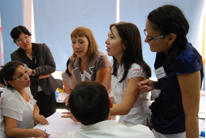
Homeowners in rural Kazakhstan with limited savings or credit history had few options to borrow money from commercial banks for home improvement projects, including those to improve energy efficiency. But in 2012, USAID teamed up with the Asian Credit Fund to help homeowners identify and evaluate energy efficient investment opportunities and improve access to finance.
The Asian Credit Fund (ACF) was established in 1997 as a micro and small business lending program in Kazakhstan. It also provides microfinance services to rural households. As part of its technical assistance services and emphasis on household energy efficiency, ACF sought to provide a credit line for home improvements but didn't know how to evaluate energy efficiency loan requests.
Through its Central Asian Energy Efficiency Support Program (CAEESP), USAID provided a $1 million portable guarantee to ACF in 2011 for energy efficiency loans in rural households.The program developed a methodology and scorecard for loan officers to use in evaluating the loans. The scorecard evaluates common measures such as insulating doors and windows, heating supply options, lighting, solar hot water and wall insulation. Habitat for Humanity International, a U.S.-based non-profit organization, participated in USAID training for the loan officers to share its practical experience from Tajikistan on monitoring small construction projects in rural areas.
Loan officers learned how to help their rural clients include energy efficient measures in loan applications. "The loan officer with ACF was a great help to our family. We were very happy to get advice on which materials to select. We saved a lot of money for heating during this winter season," said loan recipient Meureut Ismailova.
From August to December 2012, ACF made close to 100 loans for energy improvements valued at approximately $317,000. The loan amounts averaged between $2,000 and $3,000 per household. Roughly half of the loans were used to add insulation and half were used for heating system improvements, including boiler replacements. This work will continue through 2013 to help reduce greenhouse gas intensity and emissions by stimulating investment in energy efficiency technologies and projects.







Comment
Make a general inquiry or suggest an improvement.